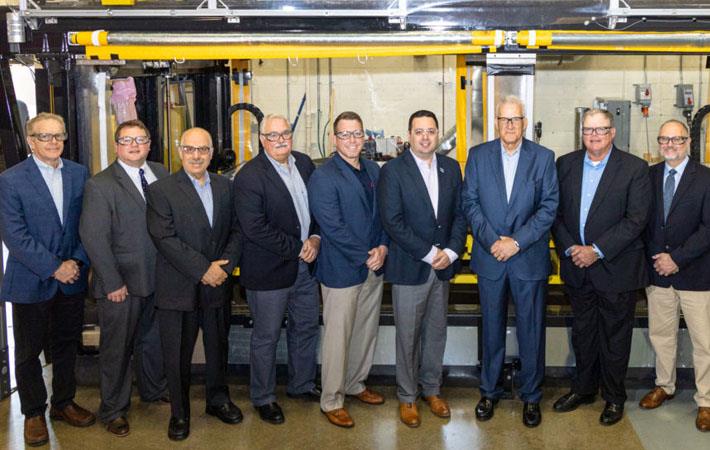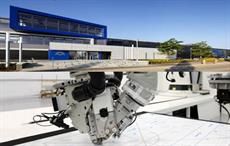Magnum Venus Products (MVP), manufacturer of composites application equipment, together with Polynt and the Department of Energy’s Oak Ridge National Laboratory (ORNL) have installed the first large-scale reactive polymer additive manufacturing system, available to industry. The system will help meet demands for stronger, more cost-effective solutions.
To revolutionise additive manufacturing and meet demands for stronger, more cost-effective solutions while remaining energy efficient.Magnum Venus Products (MVP), manufacturer of composites application equipment, together with Polynt and the Department of Energy's Oak Ridge National Laboratory (ORNL) have installed the first large-scale reactive polymer additive manufacturing system, available to industry. The system will help meet demands for stronger, more cost-effective solutions.#
MVP’s Reactive Additive Manufacturing (RAM) machine, first announced in March, and Polynt’s Reactive Additive Deposition (PRD1520) material together are reimagining additive manufacturing to enable fabrication of thermoset materials at large-scale.
To showcase the new additive technology, Polynt and MVP co-hosted a launch event on September 17 for industry leaders and partners to experience the system at DOE’s Manufacturing Demonstration Facility at ORNL. The event offered live demonstrations and discussions with the research team behind the RAM machine and PRD1520 material.
“We are excited to pave the way for reactive additive manufacturing and continue to deploy innovative solutions to meet market demands”, said Bob Vanderhoff, president and CEO of MVP. “This is a transformative technology enabling us to reach new markets and empowering our customers to deliver higher quality products with increased manufacturing efficiencies.”
While thermoplastic materials have become the norm in additive manufacturing, this unique thermoset technology has the potential to revolutionise additive manufacturing and meet demands for stronger, more cost-effective solutions while remaining energy efficient. The thermoset advantage lies in the cross-linking of polymers between printed layers resulting in stronger, more thermo-tolerant products. By collaborating with ORNL, MVP was able to scale up the technology from a benchtop solution to a commercially ready machine.
“We are pleased at the success of this project and its potential for a wide range of applications in advanced manufacturing,” said Moe Khaleel, associate laboratory director for Energy and Environmental Sciences at ORNL. “Such partnerships ensure ORNL’s research has the widest possible impact in support of a strong, prosperous economy.”
Polynt’s PRD 1520 is a specifically formulated reactive monomer material developed for use in the MVP RAM machine. The material boasts superior interlaminar adhesion, exceptional machinability, and high heat distortion temperature compatible with aerospace grade tooling application. “As a technology leader for materials development, we are continually collaborating with industry experts to anticipate market demands and innovate resin systems that meet and exceed customer expectations,” said Steve Voeks, R and D manager Americas, Polynt.
Fibre2Fashion News Desk (SV)


